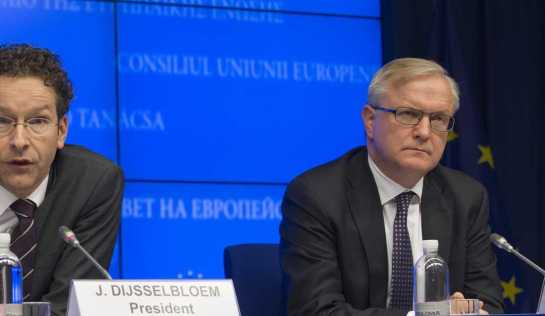The German euro-critical voice did not reach its national Parliament. Its electoral system requires a party to have at least 5% of the vote before it can partake. The new euro-critical party Alternative für Deutschland got 4.7% which is just insufficient. I don’t agree with the economic analysis behind AfD – see my alternative monetary analysis – but their analysis is important enough to be heard and discussed, and it is a shame that it is censored now.
Commentators say that Angela Merkel won the elections but we can observe that her coalition lost. Another victim of the 5% threshold namely is Merkel’s coalition partner, the conservative freemarket party FDP that got just 4.8%. The AfD received 12% of its vote from voters coming from FDP, which is the half procent point difference that caused it to go under. The AfD can claim some success.
There were other smaller parties that did not get over the threshold, with a total of 6.3% of voters. Thus in total 15.8% of the turnout has been blocked from partaking in Parliament.
This does not come across as being very democratic. The threshold of 5% has no base. A natural threshold is that a party should get at least one seat. With 630 seats and 61.8 legal voters the natural threshold is 98,000 voters per seat. The turnout was 71.5% so that this threshold drops to about 70,000 voters, which is still a sizeable number. This natural threshold is comparable to the situation in Holland, with about 65,000 voters per seat. The Dutch system is open, allows easier access to new voices, and keeps existing parties alert. The German threshold of 5% makes for a failing democracy, that is rooted in fear for other voices and a fear for an inability to co-operate.
The table below contains the data. A good democratic theory is that a turnout of 71.5% also means that only 71.5% of the seats are filled. Voters who don’t turn out then force the parties to co-operate. The majority in a Parliament of 630 seats remains at least 316 seats. When Angela Merkel doesn’t attract voters to the ballot box then this ought to cost her seats too. In the current system she gets 311 seats but in a proper calculation without the 5% threshold and with inclusion of empty seats for absentees she should get only 186 seats.

September 22 2013. Source: http://wahltool.zdf.de/de/_html5/indexf.shtml
A strict majority coalition tends to stiffle Parliament, since coalition members have to support the coalition and maintain the coalition agreement. A better democratic alternative is a government that mirrors Parliament. (The argument for some threshold may have value here.) This kind of cabinet forces parties to co-operate and to look for compromises that respect the differences in opinion. When most parties are actually in government then Parliament has more room for checks and balances, to watch over effectiveness, efficiency, quality and proper procedure.
Germany still suffers from the DDR trauma. One thing that hinders this mirroring in Germany is that the SPD has put a ban on Die Linke. The latter is a combination of (former) communists like Gregor Gysi and former members of the SPD itself, like Oskar Lafontaine (who has found his new love Sahra Wagenknecht there too). Thus, even more people are excluded. Still, exclusion of large sections of the population increases the sectarian aspects on both sides. Precisely by offering responsibility in government (for areas that appeal to them and that others can tolerate) one creates a process that emphasises the arguments, keeps voters sharp, and reduces the flight into the easy protest vote.
Now that Merkel’s coalition has lost the elections, it ought to be conceivable that the SPD provides the Kanzler, with a minority cabinet with passive support from Die Linke. An important goal for government would be the abolition of the threshold of 5% and the abolition of the ban on Die Linke, and then have decent elections over a year.
By that time it will also have become clear that the euro means a higher fiscal burden for Germany plus the surrendering of elements of national sovereignty to Brussels (if my new analysis in monetary economics is not accepted).
See my earlier critique on the German elections. When we want democracy to mean that political leaders and the electorate communicate about the relevant choices, then Angela Merkel did not show democratic leadership. The main German parties have been stone-walling the AfD. The undemocratic 5% threshold rewards them for that (though with a vengeance on the FDP). Merkel did not elaborate on the choices on the euro and instead seduced her voters into merely trusting her. Her approach has been that of the classical populist who puts personal appeal above content. Merkel has been softspoken but who turns up the volume and speeds up the recording hears mainly shrill sounds without content. For that reason the civilized world should hope that the non-CDU/CSU majority in the German Parliament blocks her continuation on the European stage.
There is electoral chaos in Europe anyway. The UK has a disastrous district system that runs counter to proportional representation – see here. France has a separate election of its President, in a failing system with two rounds, that runs counter to the Parliamentary system with a proper choice of a Premier – see here. In Italy, the largest party automatically gets at least 55% of the seats. In Greece the largest party gets a bonus of 50 seats. These are all tricks out of fear for other voices and out of fear for the inability to co-operate. The democratic approach is to grow up, listen to other voices, and learn to co-operate. An important reason is also that mathematicians have been destroying voting theory because of their lack of understanding of democracy and of empirical issues in general. See my book Voting Theory for Democracy.


